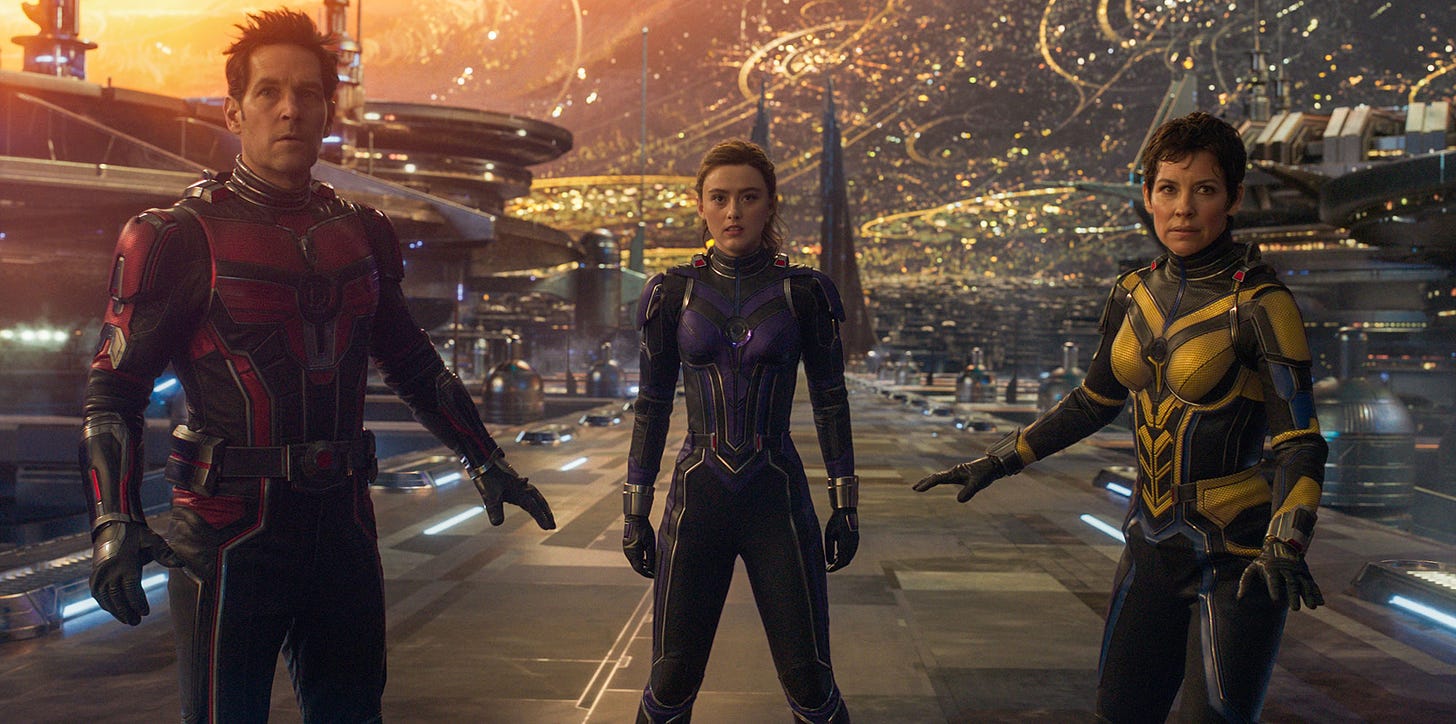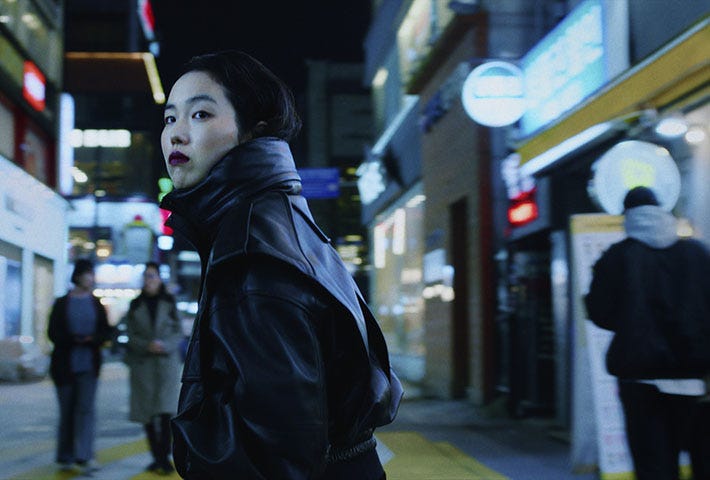In Review: 'Ant-Man and the Wasp: Quantumania,' 'Return to Seoul'
This week's new releases find the MCU getting small and follows a young woman's years-long identity crisis.
Ant-Man and the Wasp: Quantumania
Dir. Peyton Reed
124 min.
Here’s a question even Hank Pym might not be able to answer: Is it possible for a media franchise to shrink and grow at the same time? The number of Marvel films and TV series, collectively known as the MCU, continues to expand even as their possibilities seem to be contracting. Since 2008, the MCU has introduced dozens of heroes and nearly as many arenas for their adventures, from the deepest reaches of space to mystic planes of existence to, most relevant to this latest installment, the quantum realm. So why have they all started to feel like the same place with variations on the same characters playing their predetermined parts in an overarching narrative? When the MCU brought over a decade of stories together with Avengers: Endgame, it felt like a triumph of narrative engineering. Now every MCU entry feels like it aspires to be Endgame, a big, game-changing chapter in a story that never ends. It’s impressive and exhausting, a sprawling landscape of spectacle without surprise.
It wasn’t always so. Appropriately enough, smallness helped define both 2015’s Ant-Man and its 2018 sequel, Ant-Man and the Wasp. Sure, they were big, special effects-filled blockbusters, but they built their plots around lower stakes and carved out a lot of room for comic business from a fun ensemble cast. Ant-Man and the Wasp: Quantumania, written by Jeff Loveness (Rick & Morty) and directed, as were the previous entries, by Peyton Reed, jettisons part of that cast, but at least begins and ends feeling like an Ant-Man movie.
Returning as Scott Lang, the criminal-turned-world-saving-Avenger thanks to the shrinking technology of pioneering scientists Hank Pym (Michel Douglas) and Janet van Dyne (Michelle Pfeiffer), Paul Rudd again brings a light touch and easy charm. Hoping to enter superhero semi-retirement and spend more time with Hope van Dyne, a.k.a. The Wasp (Evangeline Lilly) and his now-teenaged daughter Cassie (Kathryn Newton), Scott is focusing on promoting his new autobiography and otherwise taking it easy. But all that ends when Cassie and Hank reveal they’ve been working on a device to monitor the Quantum Realm, the itsy-bitsy world where Janet was trapped for 30 years.
In short order, the collective Lang/Pym/van Dyne family finds themselves drawn into the Quantum Realm, a brutal land of strange tribal cultures and gleaming metropolises (think Edgar Rice Burroughs’ Mars and other classic pulp fantasies). It’s also, for a while, a pretty fun place to visit. The gang meets a creature made out of goo. Bill Murray shows up as one of Janet’s old resistance fighter buddies (and maybe an old flame). And the MCU reveals its MODOK, played by a returning Ant-Man character whose identity should probably be left unspoiled, even though it will be all over the Internet by the time this review posts.
They also meet Kang (Jonathan Majors), a foe with designs on the universe. And that’s where the problems begin. Not that Majors deserves the blame. He’s effective as a wearily piteous archvillain. But he also has to lay out the blueprint for a whole slate of MCU installments to come, which will feature multiple dimensions and whizzers and whatsits and wonders and… oh wait. This isn’t nearly as fun anymore, is it? It all concludes with the usual special effects assault before dumping viewers back on the street as they wait for the next installment. Still, it’s not a bad time at the movies. The MCU has always been a low-ceiling/high-floor enterprise, but it’s been hanging out near the floor for a while now. Quantumania skates skillfully across the linoleum. —Keith Phipps
Ant-Man and the Wasp: Quantumania opens tomorrow in theaters everywhere.
Return to Seoul
Dir. Davy Chou
116 min.
There’s a soppy, conventional, perhaps widely acclaimed drama to be made about a Korean orphan raised in France from infancy and not meeting her biological parents again until young adulthood, when she travels to Korea knowing next-to-nothing of the language or culture. Return to Seoul is defiantly not that movie. It’s as prickly, unsettled and restlessly creative as its protagonist, a young woman whose disconnection from her roots provokes a wide spectrum of feelings, from the expected anguish over awkward reunions and breakdowns in communication to less-expected moments of liberation and reinvention. She’s a hard person to pin down and her instability is the nitro boost that propels Davy Chou’s second narrative feature forward.
The first two scenes offer a strong indication that Frédérique “Freddie” Benoît (Park Ji-Min) isn’t going to approach this foreign terrain like a sheepish, deferential tourist. Not long after approaching Tena (Guka Han), a Seoul hotel clerk who happens to be the multilingual daughter of a French instructor, Freddie asks to listen to the pop music that’s playing through the stranger’s headphones. Then later, when Tena and a friend take her out to a restaurant, she not only sucks down bottles of soju like a Hong Sang-soo character, but expands the party to different tables and winds up taking one of them to bed with her. (She wakes up confused about whether they had sex or not, and then decides to go ahead and have it. In for a dollar, apparently.)
When Tena wonders if Freddie has come to seek out her biological parents, it’s as if the thought had not occurred to Freddie, but she nonetheless strikes out to the city’s main adoption agency with the only picture she has of her time in Korea—of her and a woman she assumes to be her mother. The process at the agency is fascinating in itself: They have to send out a telegram of the parents to see if they want to meet, and if the parents say “no,” the file is permanently closed. Yet Freddie gets a quick “yes” from her biological father (Oh Kwang-rok) and takes Tena along tomeet him and his extended family in a seaside town. The reunion has an odd effect on Freddie, who’s curious enough to stay a few days alone with them, but recoils from her father’s intense emotions. He wants her to be part of his life. She’s not so sure.
Set to an eclectic assortment of Korean singles and a thrumming original score by Jérémie Arcache and Christophe Musset, Return to Seoul has more of a rhythm than a tone, rising and falling on the whims of a character who’s simultaneously brash and uncertain. To put it in Simpsons-ese, she doesn’t have an identity crisis so much as a “crisitunity,” claiming the seemingly awkward space between cultures as a zone in which to experiment and try different looks and personalities on for size. She’s only 25-years-old, after all, and she’s transfixed by Korea, despite her inability to speak the language or show much sensitivity to its tacit rules.
As Freddie, Park is wildly charismatic and mysterious, making it seem as if her erratic decisions are also somehow inevitable and completely in keeping with how her character thinks. Chou is perceptive about the ways she doesn’t fit, like when Tena softens up her translations to prevent Freddie’s bluntness from shocking and hurting her hosts. Return to Seoul does bring across the raw power of a young woman discovering her roots, but it doesn’t get hung up in tearful reunions or tortured reckonings with the past. It exists in a perpetual figuring-it-out stage that dramas usually labor to resolve. It has more question marks than periods. — Scott Tobias
Return to Seoul opens tomorrow in limited release.









As a Korean American who is a unabashed Francophile, I cannot believe a film like Return to Seoul exists!!! Goodness, I just watched the trailer and I cannot wait to see this.
The Return to Seoul needle drops were incredible.